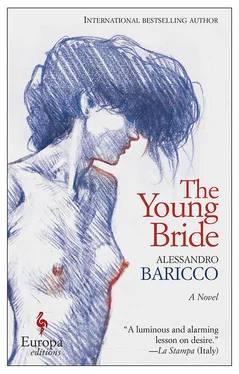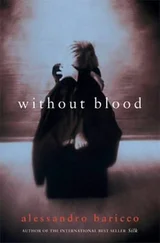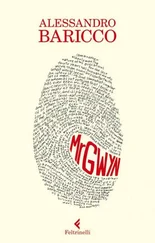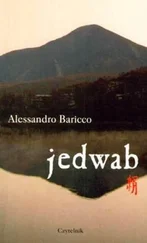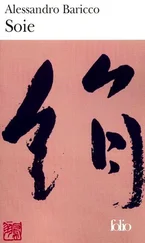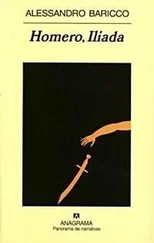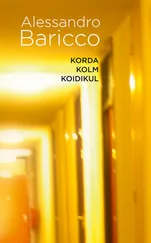Alessandro Baricco - The Young Bride
Здесь есть возможность читать онлайн «Alessandro Baricco - The Young Bride» весь текст электронной книги совершенно бесплатно (целиком полную версию без сокращений). В некоторых случаях можно слушать аудио, скачать через торрент в формате fb2 и присутствует краткое содержание. Год выпуска: 2015, Издательство: Europa Editions, Жанр: Современная проза, на английском языке. Описание произведения, (предисловие) а так же отзывы посетителей доступны на портале библиотеки ЛибКат.
- Название:The Young Bride
- Автор:
- Издательство:Europa Editions
- Жанр:
- Год:2015
- ISBN:нет данных
- Рейтинг книги:3 / 5. Голосов: 1
-
Избранное:Добавить в избранное
- Отзывы:
-
Ваша оценка:
- 60
- 1
- 2
- 3
- 4
- 5
The Young Bride: краткое содержание, описание и аннотация
Предлагаем к чтению аннотацию, описание, краткое содержание или предисловие (зависит от того, что написал сам автор книги «The Young Bride»). Если вы не нашли необходимую информацию о книге — напишите в комментариях, мы постараемся отыскать её.
The hand of the young woman in question has been promised to the scion of noble family. She is to make her preparations for marriage at the family’s villa, where the inhabitants never seem to sleep. The atmosphere turns surreal as the days pass and her presence on the family estate begins to make itself felt on her future in-laws.
In this erotically charged and magical novel, Alessandro Baricco portrays a cast of mysterious characters who exist outside of the rules of causation as he tells a story, an adult fable, about fate and the difficult job of confronting the Other and creating an Us.
The Young Bride — читать онлайн бесплатно полную книгу (весь текст) целиком
Ниже представлен текст книги, разбитый по страницам. Система сохранения места последней прочитанной страницы, позволяет с удобством читать онлайн бесплатно книгу «The Young Bride», без необходимости каждый раз заново искать на чём Вы остановились. Поставьте закладку, и сможете в любой момент перейти на страницу, на которой закончили чтение.
Интервал:
Закладка:
As we have seen, whatever then happened there — and without doubt it had happened, as we’ll see — the young Bride returned punctually, more or less cleaned up, her hair properly combed, her skin clear, and her walk graceful. She had returned from far away to take what was due her, and, as far as she knew, nothing would prevent her from appearing on time, her heart intact, to collect the joy that she had been promised.
By all accounts, it would happen before the vacation.
Modesto.
Yes?
That business of the books.
Yes?
Can we talk about it for a moment?
If you wish. But not here.
They were in the kitchen and Modesto had a slightly rigid idea of the purpose of every space in that house. In the kitchen you cooked.
If you’d like to come with me, I was just going to pick some herbs in the garden, he said.
The garden, for example, was a proper place for talking.
The day was luminous; it bore no trace of the thick haze that, in that season, generally afflicted eyes and moods. They stopped beside the row of herbs, in the limited shade of a lilac.
I wondered if there might be a dispensation, said the young Bride.
Meaning?
I’d like permission to read. To have books. Not to be forced to read them in the bathroom.
You read them in the bathroom?
Can you suggest other places?
Modesto was silent for a moment.
Is it so important to you?
It is. I grew up in a family of farmers.
A noble occupation.
Maybe, but that’s not the point.
No?
I went to school for a short time at the nuns’ and that was it. You know why I’m not completely ignorant?
Because you read some books.
Exactly. I discovered them in Argentina. There was nothing else to do. A doctor gave them to me. He brought them every month when he traveled to us — maybe it was his way of courting me. I didn’t understand much, since they were in Spanish, but I devoured them just the same. He chose the titles — everything was fine with me. It was the best thing I did there.
I can understand.
Now I miss it.
And yet in the bathroom you manage to read something.
The only book I brought with me. Soon I’ll be able to repeat it by heart.
May I take the liberty of asking what it is?
Don Quixote .
Ah, that.
You know it?
A little slow, don’t you think?
Uneven, let’s say.
I wouldn’t want to go that far.
But the language is beautiful, believe me.
I believe you.
It sings.
I imagine.
Would it really be impossible to find something else, in this house? And to have permission to read it?
Now?
Yes, now, why not?
Soon you’ll be married. When you’re in your own house you can do what you want.
You must have noticed that things are taking a long time.
Yes, it’s an impression I’ve had, too.
Modesto thought for a while. Of course, he could take care of it personally: he knew where to find books and it wouldn’t be difficult, or unpleasant, to get some to the young Bride, but clearly it would represent an infraction that he wasn’t sure he was prepared for. After a long hesitation he cleared his throat. The young Bride couldn’t know this, but it was the laryngeal prefix that introduced communications to which he ascribed a particular character of privacy.
Talk about it with the Mother, he said.
With the Mother?
The Father is very rigid, on this point, but the Mother secretly reads. Poetry.
The young Bride thought again about the inscrutable syllogisms and began to understand where they came from.
And when does she do it?
In the afternoon, in her room.
I thought she received visitors.
Not always.
The Mother reads. Incredible.
Naturally, signorina, I never told you and you don’t know it.
Of course.
But if I were you I would go to the Mother. Venture to ask her for an interview.
Knock on her door, without too many formalities — does that seem to you impossible?
Modesto stiffened.
I beg your pardon?
I mean, I could just go and knock on her door, I imagine.
Modesto was bending over the garden. He straightened.
Signorina, you know who we’re talking about, right?
Of course. The Mother.
But in the same tone she might have said “in the cellar” to someone who had asked her where the broken chairs to be taken away were, and so Modesto understood that the young Bride didn’t know, or at least didn’t know everything, and he deeply regretted it, for at that moment he realized that he had failed in the ambition with which he awoke every morning — to be perfect — because he had granted that girl the privilege of trust without having measured the circumference of her ignorance. He was distressed by this and, for a long instant, held hostage by a hesitation that was not intrinsic to either his duties or his habits. To the young Bride it seemed, for a moment, that Modesto was actually vacillating — a mere hovering in space — and on the other hand vacillate is exactly what happens when we unexpectedly perceive the profound gap that is produced, unknown to us, between our intentions and the evidence of the facts, an experience I’ve had repeatedly, recently, as a natural consequence of my choices and others’. As I try to explain sometimes to those who dare to listen to me, I have the not especially original sensation of being nowhere, but so intensely that not even God, if, on a whim, he decided at that instant to cast an eye on creation, would be able to detect my presence, I’m so provisionally nonexistent. There are drugs, naturally, for situations of the sort, and we all have our systems for passing the time during these intermittent deaths; I, for example, tend to put things in order: objects, sometimes thoughts, very occasionally people. Modesto confined himself to inhabiting the void for a handful of seconds — many, considering it was him — and one of the privileges of my profession is to know in detail what passed through his mind, that is to say the surprising quantity of things that the young Bride, evidently, didn’t know. And what the young Bride didn’t know was, evidently, the Mother. The legend of the Mother.
That she was beautiful I must already have said, but I must now specify that her beauty was, in the common view, and in that circumscribed world, something mythological. Its origins were rooted in her adolescence, which was spent in the city, hence in the countryside people were aware only of distant echoes, legendary tales, details of unfathomable origin. Yet it was known that the Mother had assumed her beauty very early and, for a time, had made spectacular use of it. She was twenty-five when she married the Father; much had already happened, and yet she regretted nothing. There’s no point in hiding the fact that the marriage made no apparent sense, the Father being a physically negligible man and chained sexually to obvious precautions, but it will all become clearer in the afternoon, or more likely at night, when I’ll feel in my fingers the sharpness suitable to describing exactly how things went, and so not now, on this sunny day when, rather, I feel capable of the softness needed to summarize what Modesto knew and the young Bride didn’t, that is to say, for example, how the trail of madness that the Mother left behind was heterogeneous, as she simply glided through the life of the city, trying out the force of her enchantment on the weaknesses of others. Two killed themselves, as everyone knows, one swallowing an excessive dose of poison, the other vanishing into the whirlpools of the river. But also a priest, who had a certain reputation, was a very good preacher, had died behind the walls of a convent, and an esteemed cardiologist had found shelter in the wards of a mental hospital. There were innumerable marriages in which wives lived, fairly comfortably, with men who were sure they had been born to love another, that is, the Mother. Analogously, at least three women, all of excellent family, all conventionally married, were known to have been so close to her, in youth, that they developed a perpetual disgust for the male body and its sexual needs. What she had granted, to each of these victims, to lead them to extremes, is information whose outlines are vague, but there are two irrefutable facts that can be trusted. The first, and apparently more obvious: the Father married a girl who was not a virgin. The second, which should be taken literally: when the Mother was a girl, she didn’t need to grant any favor to cause a person to go wild; her mere presence was generally enough. If this may not seem credible, I find that I’m compelled to give an example, choosing a detail, maybe the most significant, certainly the one that has been most widely disseminated. Everything about her was magnificent, but if we talk about the décolleté, or even about the promise hinted at by the décolleté—we’re talking about the bosom — then we are compelled to rise to a level that is hard to describe without resorting to terms like spell . Baretti, in his Index , to which we must inevitably refer if we wish to offer an objective outline of the situation, even hazards the term sorcery , but that was always a much discussed passage of his otherwise laudable work: if for no other reason than that the term sorcery suggests a malign intention that in no way reflects the well-known crystalline happiness that even the most fleeting glance at the Mother’s bosom produced in anyone who had had the courage to attempt it, or the privilege to be able to attempt it. In the long run, Baretti himself agreed. In later recitations of his Index , when he was already an old man, although very respectable, the reference to sorcery tended to disappear, witnesses say. I use the term recitation because, as is perhaps not universally known, Baretti’s Index was not a book, or a written document, but a sort of oral liturgy, at which he officiated, and which, besides, rarely took place, and was never announced in advance. On average it was biennial, it usually happened in summer, and only one thing was fixed: it started precisely at midnight. But on what day — this no one knew. It frequently happened that, because of this unpredictability, Baretti performed in the presence of only a few witnesses, if not just a pair, and one year — which turned out to be a drought year — in front of no one. It didn’t seem to matter to him, and this should allow us to understand how the discipline of the Index was for him a personal necessity, an urgency that concerned him intimately, and others only incidentally. He was, after all, a man of refined modesty, as one might logically deduce from his trade: he was a tailor, in the provinces.
Читать дальшеИнтервал:
Закладка:
Похожие книги на «The Young Bride»
Представляем Вашему вниманию похожие книги на «The Young Bride» списком для выбора. Мы отобрали схожую по названию и смыслу литературу в надежде предоставить читателям больше вариантов отыскать новые, интересные, ещё непрочитанные произведения.
Обсуждение, отзывы о книге «The Young Bride» и просто собственные мнения читателей. Оставьте ваши комментарии, напишите, что Вы думаете о произведении, его смысле или главных героях. Укажите что конкретно понравилось, а что нет, и почему Вы так считаете.
